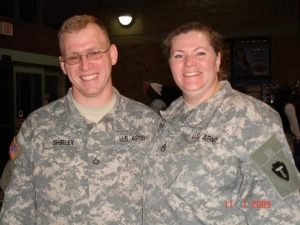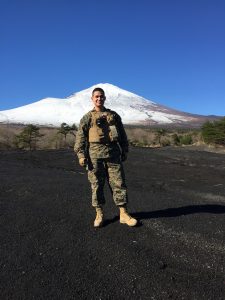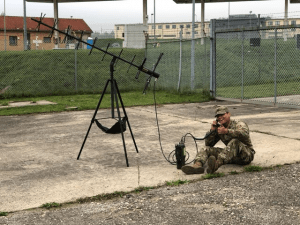November 10, 2023 WSU Tri-Cities’ Veteran’s Center student workers serve the campus and nation
By Lacey Desserault
Washington State University (WSU) Tri-Cities supports students of all backgrounds, including veterans. Recognized as a military-friendly campus, the university provides comprehensive resources for student veterans to succeed in civilian careers.
The Veteran’s Center at WSU Tri-Cities developed from a partnership with Veteran’s Affairs to help student veterans succeed in higher education. Veteran specific programs and policies help foster a welcoming environment and support both inside and outside the classroom. The center is staffed by student veterans that provide support and assistance to fellow veterans that are seeking information about educational benefits and community resources. Day-to-day, they meet with prospective students, communicate with current students about benefits, and plan events for the campus community.
Four student veterans currently staff the Veteran’s Center in a work-study program. Each has a unique military background and is studying different subjects, which allows them to connect with and understand the needs of a variety of veteran students.
Jeff Wilson is a senior studying social sciences with focuses in history, psychology, and anthropology. After serving in the Navy for 21 years stationed in Virginia, Japan, California, and Florida, he retired as a chief petty officer. Wilson enjoys his work in the Veteran’s Center. “I like helping people out and I feel like it’s an easy transition from active duty to interacting with non-military people,” Wilson said. “Not just because we work with some of the staff here but because there are always other students coming in here to work on projects with vets and we develop relationships with them too.”

Ben Shirley (left) before his first deployment with his sister.
Ben Shirley is a sophomore studying viticulture and enology. Shirley served eight years in the Army, then switched to the National Guard where he served for 15 years. After being stationed around the world in Germany, Poland, Australia, Hawaii, Iraq, Afghanistan, and the continental US, Shirley and his wife moved to the Tri-Cities to be closer to his wife’s family. He enjoys working with fellow veterans and helping them learn about the resources available. “WSU Tri-Cities is close to all the services you can need, and the staff and faculty are very understanding of unique challenges to those that have or are still serving,” he said.

Franklin Leon at Camp Fuji, a Marine Corps base in Shizouka Prefecture, Japan.
Franklin Leon is a senior studying business administration. After serving eight years in the Marine Corp. Leon ascended through the ranks to sergeant and was entrusted with the leadership of more than 50 Marines while serving in California, Japan, Korea, Philippines, Thailand, and Alaska. After his service, he was drawn to study at WSU Tri-Cities after noticing Coug flags and license plates in the community. Leon credits WSU Tri-Cities with having a welcoming environment, especially for local veterans as they navigate the transition into civilian life and acknowledges the efforts of the Veteran’s Center on campus. “I find great appreciation in the streamlined and comforting nature of this process, as it creates a secure and nurturing environment separate from the demands of daily life,” he said. “The Veteran Center serves as a welcoming space for veterans to come together, fostering camaraderie and offering a sense of belonging, which is particularly crucial in the challenging transition from military to civilian life.”

Jose Contreras making a radio check on a tactical satellite radio.
Jose Contreras served in the Army as an information management officer and retransmission team lead. He is a senior studying civil engineering. Contreras knew he wanted to pursue a high-quality education close to home, leading him to choose WSU Tri-Cities. He specifically enjoys helping fellow veteran students in beginning their educational journey and finds it rewarding when students ask questions to seek out the benefits available to them. “From experience I know that starting college can be stressful for veterans and it makes me happy to know that I can make that transition easier,” Contreras said.




